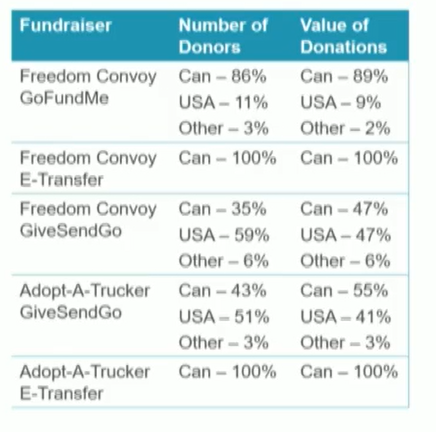
An Ottawa man raised $1.2 million in bitcoin for convoy protesters, and distributed $800k of it in 100 electronic wallets to protesters on Feb. 16/17, the inquiry hears.
This was one of three main crypto campaigns for the convoy protests, called Honk Honk Hodl!
Feb. 10, Ontario got a restraint order on GiveSendGo campaigns. This prompted Chris Garrah to switch the Stripe account needed to raise money on GiveSendGo to Jacob Wells.
TD Bank and RBC had been told of restraint order, and they couldn’t deal with convoy’s GiveSendGo funds, inquiry lawyer says.
Feb. 17, Zexi Li got a Mareva injunction against broader set of assets, including cryptocurrencies, that were then frozen.
On March 9, frozen funds were pooled in hands of a third party.
On March 9, frozen funds were pooled in hands of a third party.
This slide shows some fundraisers, via e-transfers, were entirely Canadian. Original GoFundMe was mostly Canadian, while GiveSendGo had largely American donors. #EmergenciesActInquiry #POEC 

Lich got 1.4 million to her TD accounts, the inquiry says. Only about 28k was accessed, and the rest is in escrow with the third party right now, the inquiry lawyer says.
Overwhelming majority of crowdfunding money was refunded, the chart shows.
Inquiry lawyer says GiveSendGo got about $9.8m US, or 12.4million CAD at the time. Around $3.7m went to Chad Eros's Stripe account, the rest to Jacob Wells's account. The Eros money went to escrow, the Wells money went to donor refunds.
That's the end of the presentation on fundraising.
• • •
Missing some Tweet in this thread? You can try to
force a refresh





